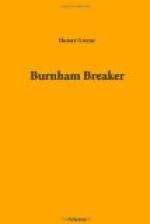Then the judge delivered the charge in a calm, dispassionate way. He reviewed the evidence very briefly, warning the jury to reject from their minds all improper declarations of any witness or other person, and directing them to rest their decision only on the legal evidence in the case. He instructed them that although the boy Ralph’s declaration that he was not Robert Burnham’s son might be regarded by them, yet they must also take into consideration the fact that his opinion was founded partly, if not wholly, on hearsay, and, for that reason, would be of little value to them in making up their decision. Any evidence of the alleged conversation at Mr. Sharpman’s office, he said, must be rejected wholly. He warned them to dismiss from their minds all prejudice or sympathy that might have been aroused by the speeches of counsel, or the appearance of witnesses in court, and to take into consideration and decide upon but one question, namely: whether the boy Ralph is or is not the son of the late Robert Burnham: that, laying aside all other questions, matters, and things, they must decide that and that alone, according to the law and the evidence.
When the judge had finished his charge a constable was sworn, and, followed by the twelve jurors, he marched from the court-room.
It was already after six o’clock, so the crier was directed to adjourn the court, and, a few minutes later, the judge, the lawyers, the witnesses, and the spectators had all disappeared, and the room was empty.
CHAPTER XVIII.
A WRIT OF HABEAS CORPUS.
Every one expected that the jury would come into court with a verdict at the opening of the session on Tuesday morning. There was much difference of opinion, however, as to what that verdict would be.
But the morning hours went by and the jury still remained in their room. The constable who watched at the door shook his head and smiled when asked about the probability of an early agreement. No one seemed to know just how the jury stood.
Sharpman and his client had been greatly disheartened on Monday night, and had confessed as much to each other; but the longer the jury remained out the more hope they gathered. It was apparent that the verdict would not be rendered under the impulses of the moment; and that the jury were applying the principles of cold law and stern logic to the case, there seemed to be little doubt.
But, as a matter of fact, the jury were doing no such thing.
They believed, to a man, that Ralph had told the truth, and that such an event as he had described had actually taken place in Sharpman’s office; and, notwithstanding the judge’s charge, they were trying to harmonize Ralph’s statement with the evidence of the witnesses who had corroborated Simon Craft’s story. This led them into so many difficulties that they finally abandoned the effort, and the questions before




